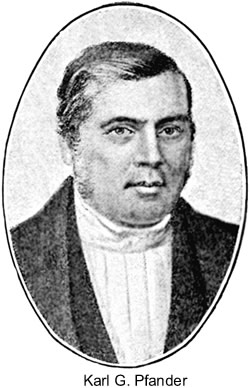Carl [Karl] Gottlieb Pfander
 Reference: Pfander, Carl [Karl]
Gottlieb(1805-1865), The Mizanu'l Haqq: The Balance of Truth,
Revised and enlarged by W. St. Clair Tisdall, The Religious Tract
Society, London, England, 1910, pp. 370. Reference: Pfander, Carl [Karl]
Gottlieb(1805-1865), The Mizanu'l Haqq: The Balance of Truth,
Revised and enlarged by W. St. Clair Tisdall, The Religious Tract
Society, London, England, 1910, pp. 370. In his book entitled, The
Muhammadan Controversy, Sir William Muir wrote the following on
the works of Dr. Pfander.
We pass on to the consideration of Dr. Pfander's writings,
which consist of three treatises: first, Mizan-ul-Haqq, or
"Balance of Truth"; second, Miftah-ul-Asrar, or "Key of
Mysteries"; and third, Tariq-ul-Hyat, or " Way of
Salvation." They were originally written in Persian, but have also
been published in Urdoo, excepting the last which is in progress
of translation. From his residence and travels in Persia, Pfander
possesses advantages which fortunately qualify him in an unusual
degree for the great controversy with our Moslem population. He
was attached for ten or twelve years to the German mission at Fort
Shushy on the confines of Georgia, from whence he made frequent
and protracted visits to Persia, penetrating as far as Bagdad, and
returning by a circuitous tour through Isfahan and Teheran. In
1836, the Russian Government, unable to tolerate the presence of
foreign ecclesiastics, put a stop to the mission, and thus proved
the means of providing us with labourers who in the field of
Persia had acquired so valuable a knowledge of its language and so
intimate an acquaintance with the religion and tenets of the
Mohammedans. Pfander joined the Indian mission of the C. M. S. in
1838.
Our author has not been backward in improving
his peculiar privileges, or in availing himself of the help which
the previous controversy and such writings as those of Dr. Lee
afforded him. His first and most important work is the
Mizan-ul-Haqq, or "Balance of Truth," as between Christians
and Moslems; and being of extraordinary value, we shall endeavour
to present our readers with a complete account of it. The original
Persian edition was published at Shushy in 1835, and the Urdoo
translation was lithographed at Mirzapore in 1843 ....1
Arabic, Greek, and Hebrew text: There are
quotations in Arabic, Greek, and Hebrew text that use Unicode.
It may be necessary to configure your web browser to visualize this
text. The Muhammadanism web site has help files for Unicode.
You can make sure that your web browser displays properly the
Unicode Arabic characters by logging onto the Internet and clicking,
Unicode.
The Table below indicates some of the changes that were made in
the text of the book. These changes were made to facilitate
word searches and to reflect the modern word spelling of the words.
For example, the modern spelling is Islam, whereas, the book
has the spelling of Islâm. So, the web version of the book
uses the spelling, Islam, for the printed book's spelling of, Islâm.
Since most readers would do a search on the word, Islam, rather than
the word, Islâm, it was felt that it would be better to substitute
the unaccented letters for original's accented letters.
Original
|
Words
|
Substitution
|
|
Æthiopic |
|
Ethiopic |
|
Cufic |
|
Kufic |
|
Taurat |
|
Torah |
|
|
Letters
|
|
|
â |
|
a |
|
ê |
|
e |
|
î |
|
i |
|
ô |
|
o |
|
û |
|
u |
Last edited 12-10-2001
|
